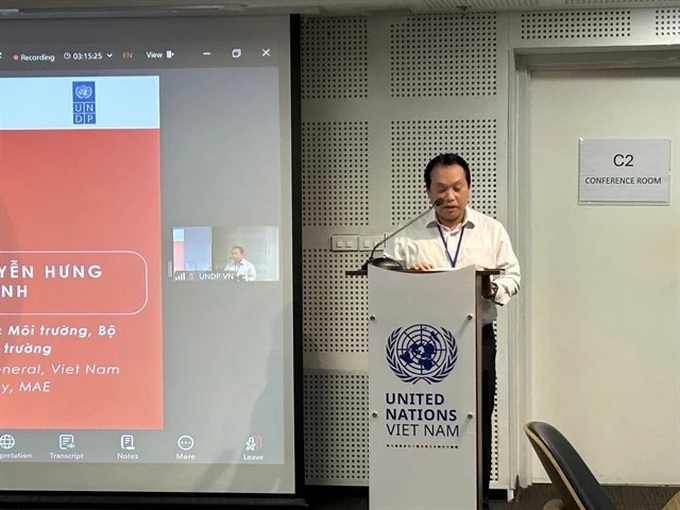
Deputy Director General of the Ministry of Agriculture and Environment’s Environmental Department Nguyen Hung Thinh delivers a speech at the event in Hanoi on June 16. (Photo courtesy of the Norwegian Embassy in Hanoi)
Vietnam has the potential to divert up to 77,000 tonnes of single-use beverage packaging waste from landfill, reduce 265,000 tonnes of CO2 emissions, and create 6,400 formal jobs and 9,600 informal employment opportunities each year through the implementation of a nationwide deposit return system (DRS), according to a new study.
The Pre-Feasibility Study, conducted by UK-based Eunomia Research and Consulting, was commissioned by the Norwegian Embassy in Hanoi and Innovation Norway, in consultation with Vietnam’s Ministry of Agriculture and Environment. The findings were presented on June 16 by the Norwegian Embassy and the Vietnam National Plastic Action Partnership.
The proposed DRS would apply to single-use PET bottles and aluminium cans. Consumers would pay a refundable deposit of between VND 1,000 and VND 2,000 (approximately USD 0.03 to USD 0.06) per item. The system is designed to align with Vietnam’s Extended Producer Responsibility (EPR) policies and support national goals to reduce marine plastic pollution and achieve net-zero emissions by 2050.
The report is expected to serve as a foundation for the ministry’s future policy development around DRS implementation.
A well-designed DRS, the study argues, can lead to high recycling rates, reduce the need for virgin materials, and limit environmental degradation. Under the system, deposits are refunded when containers are returned to designated points, such as retail stores, restaurants, cafés or centralised collection hubs.
Returned items would be sent to counting centres for verification and pre-sorting, before being transported to recycling facilities.
The system also brings broader benefits, including reduced littering, lower greenhouse gas emissions, better air quality, job creation and improved circularity for plastic and metal beverage containers.
Globally, over 40 countries and regions have implemented DRS schemes, including across Europe, the Americas, Africa, the Middle East and Oceania. Many mandatory DRS systems have achieved collection rates exceeding 90 per cent.
The study proposes a nationwide DRS in Vietnam that initially covers PET bottles and aluminium cans, which together account for 98 per cent of Vietnam’s single-use beverage container market, with PET bottles comprising 33 per cent and aluminium cans 65 per cent.
While the country’s current collection rates are relatively high — 50 per cent for PET bottles and 80 per cent for aluminium cans — much of the material is downcycled into lower-value products.
If adopted, Vietnam would become the first country in Southeast Asia to implement a nationwide DRS for beverage containers, potentially serving as a model for the region.
The system could help Vietnam integrate global best practices into local conditions and reinforce its position as a leader in circular economy development.
Nguyen Hung Thinh, Deputy Director General of the Environmental Department at the Ministry of Agriculture and Environment, stressed that Vietnam’s growing population and economy have led to sharp increases in plastic waste. He called for comprehensive and breakthrough policy approaches to manage the crisis.
“Promoting a closed-loop plastic economy, particularly for post-consumer resins, not only helps reduce pollution but also generates economic value,” Thinh said. “The DRS is a promising tool to achieve this.”
Thinh added that the ministry supports the study and sees its findings as a practical and feasible contribution to future policymaking.
Norwegian Ambassador to Vietnam Hilde Solbakken highlighted Norway’s success with DRS, where over 90 per cent of plastic bottles are recycled.
“Across Europe, well-designed deposit systems have delivered measurable environmental benefits,” she said. “Vietnam, with its strong commitment to sustainability, can benefit immensely from adopting such models.”
Solbakken noted that the system could boost recycling rates, create green jobs and reduce plastic pollution across Vietnam’s land and marine environments.
“Norway is proud to support Vietnam in turning this vision into reality,” she added.
